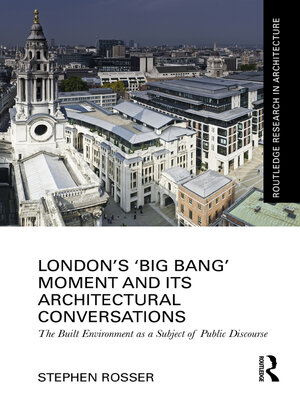London's 'Big Bang' Moment and its Architectural Conversations
ebook ∣ The Built Environment as a Subject of Public Discourse · Routledge Research in Architecture
By Stephen Rosser

Sign up to save your library
With an OverDrive account, you can save your favorite libraries for at-a-glance information about availability. Find out more about OverDrive accounts.
Find this title in Libby, the library reading app by OverDrive.



Search for a digital library with this title
Title found at these libraries:
| Library Name | Distance |
|---|---|
| Loading... |
This book explores the topic of architecture as a component of public discourse, focussing on the reception of four high-profile developments in the City of London (the UK capital's financial district) dating from the final years of the twentieth century. During this time, the City's mode of operation, culture and built environment were all transformed as a result of the market deregulation process labelled 'Big Bang'. It was also a period which saw the subject of architecture attracting public and media attention, becoming a prominent feature of national conversation.
The book examines the extensive and often contentious discourse generated by the four case study projects. It looks at how these projects were viewed and interpreted retrospectively, when they had become part of the City's long and rich history. Topics explored include building and urban form on the eve of the millennium; the place of new development in a setting of unique historic importance; the 'iconic' building and 'celebrity' architect; and the role of (then) Prince Charles as an architectural critic. Also referenced are many of the broader issues of the day, including the Thatcher government policies and the preoccupations concerning London's infrastructure, public realm, inner city areas and inequalities. Furthermore, ranging across the discourse is the theme of the relationship between buildings and global finance, foreshadowing later controversies concerning London's post-millennial towers and their impact on the capital's skyline.
The book will be of interest to researchers and students of late-twentieth-century British architecture and urban development, London's history and UK public discourse in the 1980s, a decade of profound political, economic and social change.







